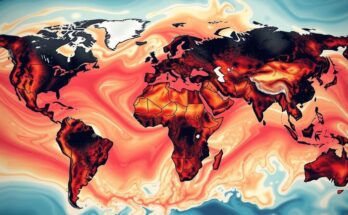A major report reveals that climate change poses significant health threats, with record levels of extreme weather events, rising elderly deaths from heat, and increasing infectious diseases. While some improvements in renewable energy and pollution reduction are noted, the need for immediate action to avert widespread health crises is urgent.
A comprehensive report released on Wednesday highlights that climate change is increasingly threatening human health in unprecedented ways. The Lancet Countdown on health and climate change, encompassing analysis by 122 experts from prominent UN agencies including the World Health Organization, underscores the urgent implications of this crisis during what is projected to be the hottest year recorded, 2023. With extreme weather events such as heatwaves, floods, and hurricanes becoming more frequent and severe, the report’s findings reveal that time wasted addressing climate change has resulted in avoidable loss of life. Among the alarming statistics presented, the report emphasizes that out of 15 tracked indicators over the past eight years, 10 have reached their most alarming levels to date. These indicators include a staggering 167 percent increase in heat-related deaths among individuals over 65 since the 1990s, a significant rise in the geographic spread of disease-carrying mosquitoes, and a record-breaking five million dengue cases reported in 2022. Additionally, the report reveals that global emissions of major greenhouse gases have continued to rise, attributed partially to increased oil and gas production amidst the global energy crisis following the conflict in Ukraine. The financial scale of fossil fuel subsidies reached an astounding $1.4 trillion in 2022, dwarfing commitments made for a transition to sustainable energy. However, progress is evident with a reported decrease in deaths from air pollution linked to fossil fuels and a nearly twofold increase in clean renewable energy usage from 2016 to 2021. Executive Director of the Lancet Countdown, Marina Romanello, expressed the urgent need for immediate action, stating that “there is really no more time to waste” as inaction continues to have dire consequences. Romanello recommends a climate-conscious lifestyle, urging individuals to adopt a more sustainable diet, reduce reliance on fossil fuels, and support policymakers committed to addressing climate change.
The report seeks to analyze and present the growing consequences of climate change on human health, evidencing trends and statistics over the past eight years. With global temperatures on the rise and various forms of extreme weather becoming more commonplace, the implications for public health increase substantially. This report coincides with significant global events, such as the upcoming United Nations COP29 discussions in Azerbaijan, emphasizing the urgency of collaborative international action to mitigate climate change effects on human health.
The report serves as a dire warning about the health implications of climate change, reinforcing that immediate action is critical to prevent further loss of life. Although some progress in reducing pollution and increasing renewable energy utilization is noted, the overall threat to health remains at an unprecedented level. The insights provided by leading health experts underscore the necessary urgency for governments and individuals alike to adopt effective strategies to combat climate change’s far-reaching effects.
Original Source: www.barrons.com




